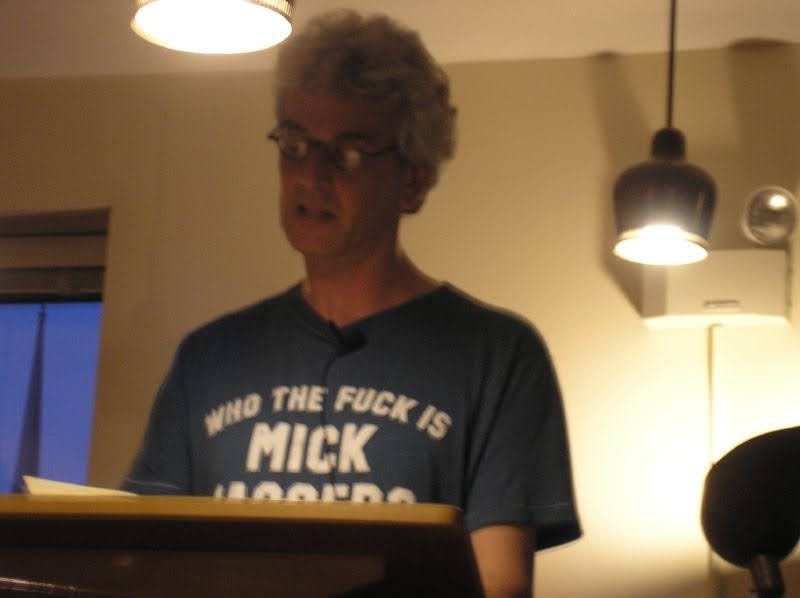Mourn, but organize
It's Election Day in Canada, and a tragic day in music-critic world
1) A plea to my compatriots
Si tu vois mon pays/ Mon pays malheureux …
I’ve been finding it difficult to write the past couple of months. The daily news is the biggest reason. I really do believe that culture and creativity always matter, that they’re part of the point of any fight for a better society, that there will be singing about the dark times, yadda yadda. But day to day it can feel like nothing’s worth attention if it doesn’t stop the wanton destruction in the U.S. And it’s hard to believe anything can stop it anytime soon.
Canada now risks crossing to that same side. That we too will go wreaking havoc in the name of kneejerk resentments, reactionary “anti-wokeism,” disregard for other countries, and a sub rosa disbelief in the ideals of democracy.
Normally I confine the politics here to ideas found in art. Today, on Election Day, I’m going to make a plea to my Canadian readers, just in case.
First, please just vote. In the last couple of elections, the biggest single bloc was non-voters, more than voters for any single party. The polls have narrowed of late as they usually do. We’ve seen in the U.S. how far wrong polls can be. You can't take anything for granted. If you think there’s no difference between the main parties, well, Doug Ford is worse than what came before. Harper was worse than Trudeau. Pierre Poilievre is worse than all of those. Even in an inherently unjust system, there are still worse outcomes that will hurt greater numbers of people.
Please vote, then, to keep Pierre Poilievre out. He’s pledged to use the notwithstanding clause freely to pursue his law-and-order agenda, Constitution and Charter be damned. This supposed free-speech defender wants to follow suit with Trump in stamping out “wokeness” (in this context, anything that acknowledges diversity), specifically in education (including scientific research) and against student protesters, who in the U.S. have been having their visas cancelled and getting deported. Poilievre vocally cheered Trump in the last U.S. election, only to change course when the tariffs came along, as if Trump hadn’t been promoting tariffs his whole campaign. Poilievre wants to gut the CBC—and who doesn’t, some of the time, but his approach will only impoverish the national discourse. He’s a lifelong right-wing culture warrior who’s never had any non-political job or life experience, and who would be lining up with all the Fox News toadies and “freedom caucus” types to kiss Trump’s orange rump if he were American. He’d probably rather be American. And that you were too.
Here’s a place to read about the parties’ arts policies.
To keep Poilievre out, we need to vote strategically. Voting isn’t about expressing your soul. It’s a limited tool to influence the balance of power. Feelings don’t really matter here. The practical consequences do.
So please vote for the most statistically likely candidate to keep your riding from going blue. Even if (as it was for me) it’s not your usual party of choice. You can look up your riding on one of these websites to see what your best choice is: VoteWell, SmartVoting, or QC125—that last the French version of Canada338, which was brought down this weekend by hackers who don’t want you to have that information.
Good goddamn luck to us all.
2) Put out the Dark: RIP Joshua Clover

As worried as I was about the news on Sunday afternoon, I could not have anticipated the absolutely terrible news I was about to get: That Joshua Clover, the brilliant critic, editor, poet, professor, theorist, and agitator (in the broadest sense), had died the night before, of complications from an unclear illness. He was 62. Many of us are feeling stunned and shaken.
I’m not the best person to eulogize Joshua. I’d known him for almost two decades, but only as (I hoped) friendly acquaintances and colleagues. Still, I was by turns dazzled, intimidated, amused, and irked by him, sometimes all at once. He was a superb writer, and the kind of radically abrasive intellectual you read about and dream of meeting when you’re young, the kind who tests your mettle without sparing your sensitivities. He could also be highly generous and supportive.
Joshua made his mark in the music-critic world with his often scalding takes on pop culture under the pseudonym Jane Dark in the Village Voice in the late 1990s and early 2000s, as well as in the early-poptimist zine/blog “Jane Dark’s Sugar High” (whose web archives deserve better than their current state, like most). Some people were pissed off about his byline drag act once it came out, including in the notorious 1999 Rock Critical List by “JoJo Dancer,” but one couldn’t deny the sense of style. He also had a regular gig at Spin, while living in Paris, but resigned in discomfort over helping capitalists hawk product at kids—going to New York to do it the week of 9/11. He told that story in 2015 with one of the first viral narrative tweetstorms ever, #HowIQuitSpin, arguably helping found the social-media genre that gave us Zola.
A UC Davis English prof, Joshua was also a committed Marxist theorist and activist, which led to a right-wing campaign against his tenure some years ago, foreshadowing the current broader attack on universities. But I prefer here to focus on what I know best, his critical work. That includes his great book 1989: Bob Dylan Didn’t Have This to Sing About, an incisive tour through the ways the fizzling of the Cold War and the so-called “end of history” were reflected in late-80s/early-90s pop music, from Jesus Jones to Public Enemy, Nirvana, and of course the Scorpions’ “Wind of Change.”
More recently he’d become (with Emily Lordi) the co-founder and co-editor of the Duke Singles series. It’s the equivalent of the 33 1/3 series of books about albums, but instead about single songs. Which is, let’s face it, cooler. Joshua wrote the exemplary first volume, a tour de force on Jonathan Richman and the Modern Lovers’ “Roadrunner.” It places that pre-punk banger “at the intersection of car culture, industrialization, consumption, mobility, and politics.” We had him on the Popular Music Books online series to talk about it with Elizabeth Nelson and Eric Weisbard, and it’s become our most popular video on YouTube. It’s a perfect sampler of Joshua’s speed, wit, and spice. Just look at that thumbnail.
Joshua was also a vital early participant in the Pop Conference, which was how I met him—lobbing interrogative bombs in Q&As, chatting hyperactively at the café or bar. Most importantly there, he was the inventor of the fantastic panel format called “Critical Karaoke”: Each writer delivers a piece about a song in the exact time the song itself is playing. It turns criticism into a kind of athletic contest while challenging us to think rigorously about concision, form, and what our words actually can add to the music. Even when Joshua stopped showing up to Pop Con so often, the practice continued on, and I recommend it to anybody as a writing workout and nerdy party game.
It was also in conversation at a Pop Con that I learned about his near-fatal bicycle accident and subsequent health-care travails that had severely compromised his internal organs. I have no real idea, but would not be surprised to learn that his early death was a long-term result of that ordeal.
Before any of the above, Joshua was already an award-winning poet. His first book, Madonna anno domini, was endorsed by Jorie Graham and John Ashbery, ffs, and won the Walt Whitman Award from the Academy of American Poets in 1996. I’m also very fond of 2006’s The Totality for Kids. One of the poems there is “In Jaufré Raudel’s Song,” which includes the line, “There is a limited number of nights, though no particular night can prove this.” Last night unfortunately furnished that missing proof.
The light (and the Dark) that went out this weekend was singular, a person who made good trouble, as John Lewis put it, and a healthy dose of the bad kind too. He was the sort we couldn’t afford to lose right now. I feel lucky that I knew him, and I ache for those who knew and loved him better. We’ve still got the power of the modern world, got the radio on, but our favourite DJ has left his post, and the rest is static.


Thank you for these lovely words about Josh Clover.
Thanks for sharing this, Carl. I edited Josh at SPIN for a while, tried to anyway, never knew him well, but was always fond, awed & slightly scared of him (in a good way). My heart goes out to all grieving his death.